DEAD MISTRESSES, NOT LIVE MINISTERS
They're a better source of peers, says
Conrad Russell. Though a Liberal Democrat,
he defends the hereditaly principle
ARISTOTLE once remarked that the lot is the most democratic form of selection. The present Leader of the House of Lords, Lord Cranbome, very sensibly, has realised that any defence of the hereditary peerage must rest on this principle. It must be conceded at the outset that the princi- ple contains some truth. When we com- plain that our political system is losing its sense of legitimacy, it is not the declining reputation of the House of Lords of which we complain, it is the declining reputation of the House of Commons. The notion that we can restore respect for the House of Commons by punishing the House of Lords is a bit like the old notion that one could punish the misdemeanours of an infant Prince of Wales by whipping his whipping-boy instead of him.
It has been noteworthy that when the Conservative Govenunent has suffered defeats in the House of Lords, it has resist- ed the temptation to raise the traditional cry of 'Peers v. People'. This has been very wise of it, since it is by no means self- evident that the people backed the House of Commons against the House of Lords. In the hotly contested vote of 1988 on free eye and dental check-ups, the opinion polls showed 87 per cent supporting the Lords against the Commons. On railway privatisation, the Government did a little better, enjoying the support of 28 per cent of the voters. This was enough for the Government to invoke the support of `the elected chamber'; it did not invoke the support of 'the people'. One of the central weaknesses of our political system is a growing doubt as to whether the House of Commons repre- sents the people. This is not the traditional third-party point, though that point is not without substance. The problem is that political parties are a cartel, and like any other cartel they are designed to restrict competition. In the mid-1980s, the British Social Attitudes survey estimated socialists and Thatcherites at 15 per cent of the electorate apiece. The only choice offered to the electorate was by which 15 per cent they chose to be represented. If or when the House of Lords represents the people better than the House of Commons, it is because it contains crossbenchers, and so breaks the cartel to let non-party people into politics. The other fault of the House of Com- mons is that it is executive-dominated. Members of the Lords do not depend on party machinery to continue their careers. They are therefore free to vote against a government of their own party without fear of the sort of reprisals to which Tony Blair tells us Labour backbenchers in the Com- mons will be subject if they do the same thing.
The existing system thus has real advan- tages. Yet that does not make it legitimate. A justification resting on the principle of the lottery can only stand if it can be shown that the lottery is not rigged. That is the test the hereditary principle cannot pass. This is not just because it returns too many Conservatives. Liberals know there is a machinery to deal with that, and it works. Moreover, it is not a fact of nature that the hereditary peerage is Conservative; it is a temporary fact which has only been true since 1885. It may well be on its last legs, since Lady Thatcher has shaken the Tory aristocracy almost as much as Gladstone shook the Whig aristocracy. As Denis Healey put it, 'She took the Tory Party from the landlords and she gave it to the estate agents.' Tony Blair might have been wise to let that development run its course, instead of driving the aristocracy back into the arms of the Conservative Party.
It is more serious that, save for a few dis- tinguished Scottish peers, the hereditary principle does not admit women to lottery tickets. If we had carried Lord Diamond's bill to allow women to succeed to English peerages, we would have been in a much stronger position to defend the hereditary principle than we are. More generally, the hereditary principle offends the basic prin- ciple of a lottery, that anyone should be allowed to buy a ticket. I believe that the only other hereditary legislature in the world now is the House of Chiefs in Fiji. It is no more a sufficient parallel for the hereditary peerage than the hut tax in Papua New Guinea was for the poll tax. It is no objection to this to quote the monar- chy. The monarchy is a political referee, not a political player, and there is a lot of sense in choosing the referee by a different principle from the players. It lessens the danger that the referee might try to start playing.
To say the present system will not do is not to answer the question as to whether the proposed alternative of a purely nomi- nated House is better or worse. To answer that question, we must consider what the House of Lords is for. It is a revising cham- ber, to redraft bad legislation, and also to check the executive — to control the arro- gance of power. What I did not realise before sitting there is how much these two are the same job. Badly drafted legislation is very often badly drafted because it is designed to free the Secretary of State from control. This is regardless of party — it is true of all parties in all centuries, and there is no sign whatever that the election of Tony Blair would give us a prime minister more ready to submit to control.
Under these circumstances, would it really help the Lords to do their job to allow Tony Blair to choose all our mem- bers? One of the saving graces of the hereditary peerage is its immunity to patronage: our benefactors have the advantage of being dead. Would an entire- ly nominated House of Lords really stand up to an angry prime minister? When I was a new peer, I once agitatedly reported that both the Treasury and No. 10 Down- ing Street wanted to reverse one of our amendments on which I was very keen. I got the answer, 'It is a strong combination — one of the strongest in politics. There is only one thing that can defeat it, and that is the House of Lords.' On that occasion, a compromise was reached behind the scenes. Would the same thing happen with a House entirely appointed by the prime minister? If the Lords were the prime min- ister's mirror, would he not be tempted to emulate Snow White's stepmother if he did not get the answer he wanted? And does Tony Blair need temptation to indulge that foible?
Our prime minister controls both parlia- mentary sovereignty and the royal preroga- tive — the two most untrammelled forces known to English law. He appoints his min- isters, and his Lord Chancellor appoints the judges. He is allergic to restraint by international treaties, and controls the Par- liament which is supposed to check him. The only part of the machinery around him which he does not control is the hereditary peerage. He is nearly as unchecked as King John before Magna Carta. It is perhaps fortunate that, like King John before Magna Carta, he still has a baronage.
When we have a Second Chamber in which lot and election share with appoint- ment in choosing members, when we have machinery for controlling a prime minister which the prime minister cannot control, then there will be no use for a hereditary peerage. Meanwhile, Paddy Ashdown is surely right that it is better to have the serendipitous offspring of royal mistresses than a nominated super-quango. To put it another way, I would rather have the off- spring of dead royal mistresses than of live ministerial mistresses.
The author is himself an hereditary peer: the Fifth Earl Russell (Cr 1861). He is a Liberal Democrat front-bench spokesman and Pro- fessor of British History at King's College, London.
































 Previous page
Previous page